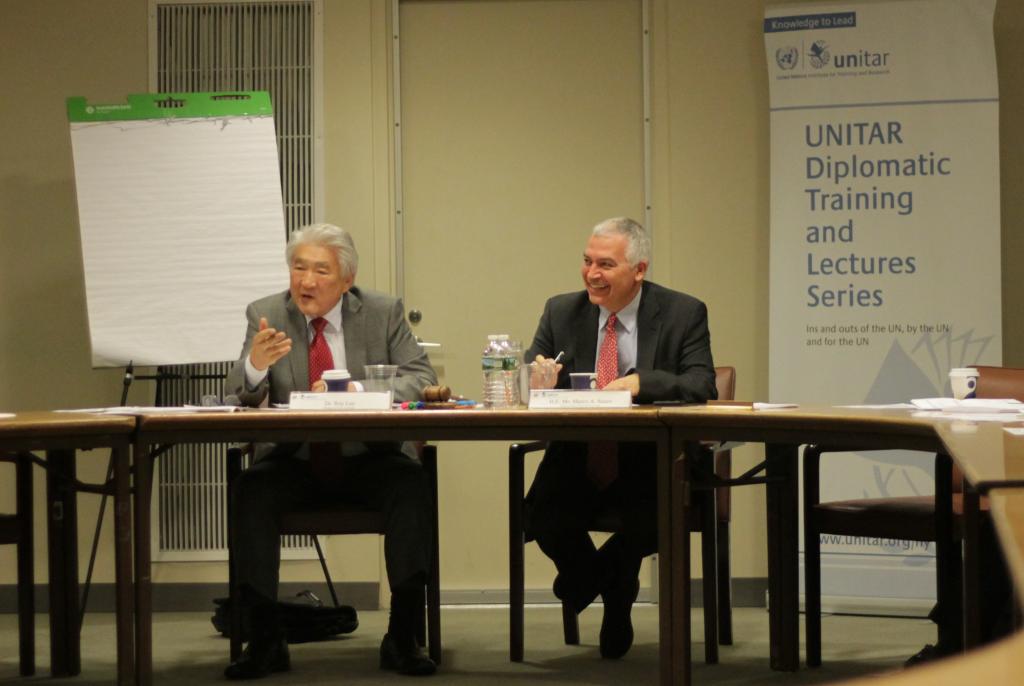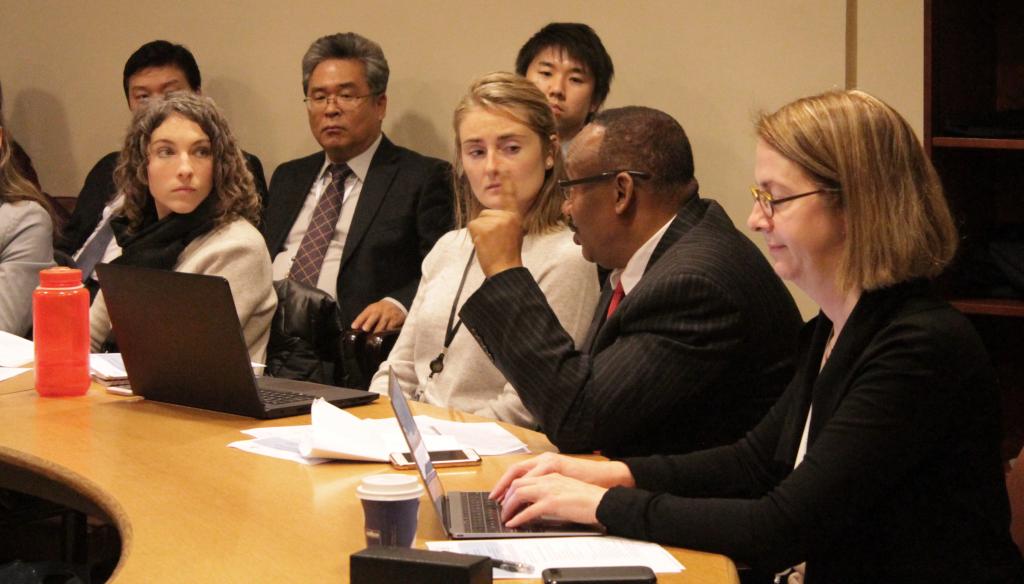UNITAR Organizes Course on the International Criminal Court
 26 January 2017, New York, USA - The United Nations Institute for Training and Research (UNITAR), sponsored by the Permanent Mission of Sweden to the United Nations, organized a full-day coursed entitled, “International Law: Challenges and Opportunities for the International Criminal Court”. The event was widely attended by more than 50 delegates from a number of different Permanent Missions. The entire course was taught by Doctor Roy Lee, Professor at Yale University.
26 January 2017, New York, USA - The United Nations Institute for Training and Research (UNITAR), sponsored by the Permanent Mission of Sweden to the United Nations, organized a full-day coursed entitled, “International Law: Challenges and Opportunities for the International Criminal Court”. The event was widely attended by more than 50 delegates from a number of different Permanent Missions. The entire course was taught by Doctor Roy Lee, Professor at Yale University.
During the first session: “1947-1998: Fifty Years Searching for the Acceptable Approach”, Dr. Lee began an interactive discussion where all delegates introduced themselves. Following the introduction, Dr. Lee began a lecture on the history of the creation of the International Criminal Court; assessing the difficulties the ICC had faced before its implementation. Dr. Lee gave extensive examples, such as the division bodies of the political civil rights and the social economic division due to political considerations. Among other difficulties the ICC faced, was the adoption of the Genocide convention (1947) who took around 35 years to be implemented.
During the discussion Dr. Roy Lee gave his personal experience which gave a more personal touch to the training. Dr. Lee stated that one of the first tasks he had to complete at the beginning of his employment at the U.N (around the late 1960s) was to do research on how many Member States were in favor of creating the ICC. The result he obtained was only one, Costa Rica.
 The period from 1947 to 1988 was one of the other main topics of the workshop. Dr. Lee and the delegates discussed several of the arguments that were pro the creation of the ICC and some against. On the against the creation of the ICC side we had the political views, whether this body was going to be too political and power states were thus going to used it against weaker ones. At that period of time some Member States argued whether the ICC was going to overlap national courts. The end result was the U.N. asking the International Law Commission to examine the possibilities.
The period from 1947 to 1988 was one of the other main topics of the workshop. Dr. Lee and the delegates discussed several of the arguments that were pro the creation of the ICC and some against. On the against the creation of the ICC side we had the political views, whether this body was going to be too political and power states were thus going to used it against weaker ones. At that period of time some Member States argued whether the ICC was going to overlap national courts. The end result was the U.N. asking the International Law Commission to examine the possibilities.
The Second session on the International Criminal Court System led once again by Dr. Lee, outlined the best possible agreement for the creation of the ICC (like-minded states; leadership and facilitators; NGOs). It was agreed that the ICC would charge individual criminal responsibility. It would hold a combination of civil law and common law systems. An individual prosecutor would be monitored by a panel of judges to ensure objectivity, independence and impartiality. The ICC also is also composed by a due process and rights of the accused. A trust fund was also created to compensate victims and protect them and witnesses.
Dr. Lee outlined the division of the ICC in three categories of crimes: war crimes, crimes against humanity, and genocide. Crimes against aggression were later on added as the fourth crime category. It must be highlighted that the ICC does not condemn to death penalty or life imprisonment.
During the fourth session the role of the Security Council was discussed. In the past the Permanent Members of the Security Council had opposed the establishment of the ICC because they questioned on how it would be considered a situation to be judged by the ICC when the Security Council’s main purpose was to do just this. It was later resolved by stating that a ‘situation’ must be referred to the IC where the court otherwise has no control.
In the second half of the day, Professor Lee examined the ICC on how best to use it and the crimes. The main discussion was African countries. Participants were asked to share their opinion. Professor Lee also explained the implications of what ‘being a contacting  party’ meant. He gave Ukraine as the example of an Ad Hoc referral situation under Article 12 of the Rome Statute.
party’ meant. He gave Ukraine as the example of an Ad Hoc referral situation under Article 12 of the Rome Statute.
During the second and final session of the afternoon Dr. Lee discussed the challenges of the ICC. He explained that the first and major problem the ICC faces is the protection of civilians; because how do you define who an innocent civilian is? Professor Lee defined civilians as those who are not involved in an armed conflict. The collection of evidence was identified as the second biggest problem the ICC has. Collection of evidence is a big problem because witnesses do not want to risk their lives and these can only be collected during the conflict or straight after. The final discussion was led by the legal advisors of Linchestein and the UK on the functional political issues of the ICC.
Photos: Lecturer and participants of the workshop

